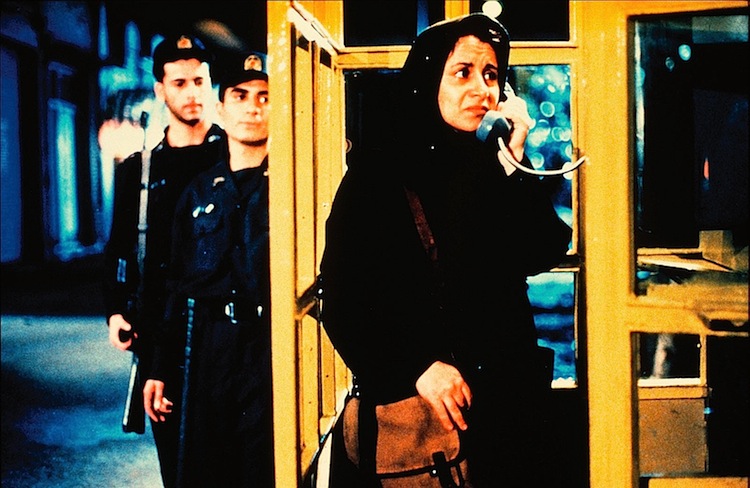By Joe Bendel. It is good to be a man in Iran, provided you do not care about religious, political, or economic liberty. However, women must endure a profoundly misogynistic and frequently brutal society that regards them as little more than the chattel of men. Jafar Panahi confronted the unjustness of Iran’s treatment of women directly in The Circle, the winner of the 2000 Venice Film Festival’s Golden Lion prize – and a film which was promptly banned in Iran. Not content to stop there, the Iranian government has recently barred Panahi from further filmmaking for the next twenty years and sentenced him to six years in prison. Indeed, Panahi’s circumstances only heighten the poignancy of The Circle, which screens this Friday as the concluding film of the Asia Society’s retrospective-tribute to the persecuted filmmaker.
Solmaz Gholami (remember that name) has just given birth to a healthy baby girl. This should be happy news, but her mother is distraught. The in-laws were expecting a boy and will surely abandon their daughter-in-law and grand-daughter. The obvious high school science fact that it was the husband who failed to supply the Y chromosome is lost on such medieval fundamentalists. As Gholami’s mother seeks help from her family, Circle peels off, focusing on its next set of characters.
Three women have just been released from prison on unspecified “morals” charges. However, the Iranian system sets them up in a perverse Catch-22, kicking them loose without the necessary identification papers should they be stopped once again by the police (who are definitely out hunting for women in their situation). Lacking a male chaperone, sweet-tempered Nargess cannot take the bus trip back to her provincial home. Despondent, she seeks another friend, Pari, an escapee with even greater problems. She is four months pregnant with the child of her executed lover. From Pari, the chain continues, introducing a desperate mother and a woman arrested as a prostitute (perhaps not without some justification in her case), who ultimately brings the story to its symmetrical conclusion.
Sexism is a wholly insufficient term for the abuses Circle dramatizes. A stinging indictment – but also an honest, frequently moving human drama – it is not hard to see how it ran afoul of the state censors. Yet the film is not just a testament to Panahi’s artistic integrity. The cast deserves tremendous credit, especially those playing fallen women while living under a literal-minded fundamentalist theocracy. Though Circle is the only credit listed on IMDB for many of the actresses, their work has a powerful immediacy. They are frighteningly believable. Perhaps most haunting is Nargess Mamizadeh as her namesake. Young and innocent, to paraphrase the tagline of one of Circle’s international posters, she could only be guilty of being a woman.
To be banned by the mullahs might be a greater accolade than the raft of awards Circle won on the international festival circuit. Of course, the repercussions for Panahi have been severe. A truly bold film, Circle has only appreciated in importance and relevance with the regime’s campaign against the filmmaker. Highly recommended, it screens this Friday (3/11) at the Asia Society—and once again, tickets are free.
Posted on March 7th, 2011 at 10:01am.
